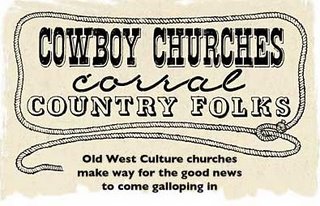Can One Size Fit All?
 I had an interesting lunch with a gentleman who recently began attending my church. He informed me that he had moved to our community from the Midwest a few months ago, and that he and his wife had been actively seeking a church. He came from a non-demoninational, evangelical background. In fact, he had just come to know Christ about five years ago. He further informed me that we were #7 in his visiting order. He had simply been visiting congregations at random from the listing provided on the "church page" of the local weekly newspaper.
I had an interesting lunch with a gentleman who recently began attending my church. He informed me that he had moved to our community from the Midwest a few months ago, and that he and his wife had been actively seeking a church. He came from a non-demoninational, evangelical background. In fact, he had just come to know Christ about five years ago. He further informed me that we were #7 in his visiting order. He had simply been visiting congregations at random from the listing provided on the "church page" of the local weekly newspaper.He let me know that he loved our church. But the thing that shocked him the most was the fact that we were a Baptist church. Indeed, he told me that we were unlike any Baptist church he had ever seen. He had visited several over the years, and the word he used to describe his experiences was an interesting one ... "cookie cutter." His experience, for the most part, in Baptist churches had pretty much been the same. He saw it is "predictable." After he visited in our worship, he felt compelled to call home and talk to his former pastor to get the "low down" on this "new generation" Baptist stuff. Was it legit? Could he trust it?
Thankfully, that pastor affirmed our denomination and our church's ministry. This man and his wife are rapidly and joyfully integrating into the life of our church.
But those words he used have stuck with me ... "cookie cutter."
Kima Jude, in the new Fall 2006 edition of On Mission magazine, has written an interesting article entitled "One Size Doesn't Fit All: Planting Missional Churches." It is a great article. I think that, if there were any way to make it happen (and, obviously, there is not), it should be required reading for every pastor of every Southern Baptist church. Perhaps, then, much of the fear and animosity directed at church plants (and church planters) by established, historical churches could be averted. Perhaps, then, we could combat the attitude and appearance of "uniformity" that exists among our churches, that idea that we are a bunch of "cookie cuter" congregations.
Following are a few quotes from the article:
"Missionaries still travel great distances to share Christ and plant churches, but others merely walk around the block to do it. Like their international counterparts, North American church planters and churches take a missional approach to church planting. They identify an unreached people group, learn their language, study their customs and notice how they dress. When they plant a church, they design it to be biblically sound and -- to some degree -- resemble the people they hope to reach."
"... on mission Christians no longer have to travel far to encounter exotic cultures peopled by those who speak a different language and practice different customs."
"A church plant seeking to reach people in North American culture cannot take a cookie-cutter approach."
"Missional churches take the unchanging Gospel into the culture they find themselves in whether it is traditional, contemporary, emerging or something else."
Great points all. But the problem in North American churches, and North American church planting, arises at the interface of church and culture (especially in the South). Many, if not most, of our Southern Baptist churches which exhibit a traditional mindset and methodology tend to view the culture of church as being "against" the culture of "the world." Indeed, the biblical references to "the world" are often taken as proof positive that all things of the world are evil, therefore culture is evil, therefore the church must be insulated from it. So the church develops its own isolated culture, with its own practices, rules, and even its own language (which I affectionately call "Christianese"). One must abandon the culture of the world and become "assimilated" into the culture of the church in order to fit in ... in order to be truly holy. You see the line of reasoning...
Then, when a church planter and a new church plant enter into a community, seeking to engage the culture and people "where they are," that church planter and church plant are so often tragically painted as "worldly," "liberal," "charismatic," and, most assuredly, "not Baptist." I know that this is the case, because it has happened to me and the church that I have planted in my community. When word got out that we would not have the word "Baptist" in our name, were wearing jeans to church, used videos in worship, didn't have a "Sunday School," and didn't hold monthly business meetings, we were alienated and ostracized by the local Southern Baptist community. And all that we attempt to do is meet people "where they are" and do ministry within the culture that we live.
Is my experience the exception? Or does it tend to be more of "the rule," especially in the churched (albeit declining churched) southern United States?
I would love to hear about the experiences of other church planters. What can we do, as a denomination, to rediscover the truth of being missional (within the culture) in all of our churches, as well as our church plants? What can be done to awaken a passion for church planting among all of our churches? How can we become known as "cookies" of all shapes, sizes, colors, and flavors?








